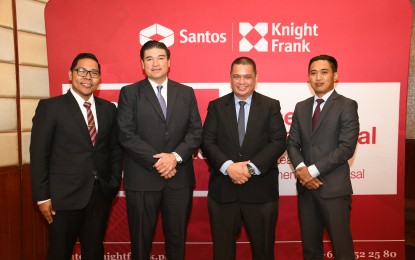
REAL ESTATE INDUSTRY EVOLUTION: Rick Santos (2nd from left) Chair and CEO of Santos Knight Frank, predicts the Real estate Investment Trust (REIT) will soon be the business model defining the real estate sector. It is seen to give smaller investors the opportunity to invest in high-value real estate assets along with the big players. (PNA photo by Christine Cudis)
MANILA -- Since the passing of Republic Act 9856 in 2009, stakeholders of the real estate sector have been eagerly anticipating the realization of the Real Estate Investment Trust (REIT) vision.
A REIT is a publicly-listed stock corporation that owns income-generating real estate assets, such as malls, offices, and hotels. Envisioned to promote the development of the capital market, REITs are instruments to generate capital. REIT companies are also mandated by law to distribute 90 percent of their retained earnings as dividends, which benefit investors.
With the recent move by the government to amend rules on REITs, developers have been increasingly looking at listing their income-generating assets as REIT companies.
"It is one of the priorities of the Finance Secretary when he took his post, definitely, the future is looking good for investors," Rick Santos, Chairman and CEO of Santos Knight Frank said in a press interview at the Makati Shangrila Hotel, Monday.
The REIT Act, passed by Congress in 2009, would have allowed companies to spin off assets that earn recurring income such as shopping malls, hotels, and even toll roads and list these on the Philippine Stock Exchange.
The REIT law was ultimately shunned by investors after the DOF, under the term of President Aquino, feared billions of pesos in revenue losses and imposed tax penalties on the transfer of real estate assets to a REIT vehicle.
In the same respect, the SEC required that the public should own a controlling stake in a REIT in three years.
“REITs have the power to democratize the Philippine property market, allowing the individual investor on the street to invest in high-value real estate assets along with the big players," Santos added during his presentation.
He also announced that REITs will substantially boost the Philippines’ capital market as a new capital for developers will enable expansion of the real estate sector not only in Metro Manila but also in the provinces.
Generally, REITs have outperformed non-REITs and the overall domestic market over the past one to five years in major Asia Pacific markets, according to Santos Knight Frank’s analysis of REITs in Singapore, Japan, Hong Kong, and Australia from Thomson Reuters Datastream.
Santos Knight Frank estimates the prime and Grade A office market in Metro Manila’s four major central business districts (Bay Area, Makati, BGC, and Ortigas) at PHP 1.02 trillion.
REITs are not only limited to office assets. With 4.3 million square meters (gross leasable area) in Manila’s retail, Santos Knight Frank expects developers to convert mall assets into REIT companies.
Assets such as energy, infrastructure, transportation, hospitals, schools, and tourism have also been converted into REITs in other countries. (PNA)
